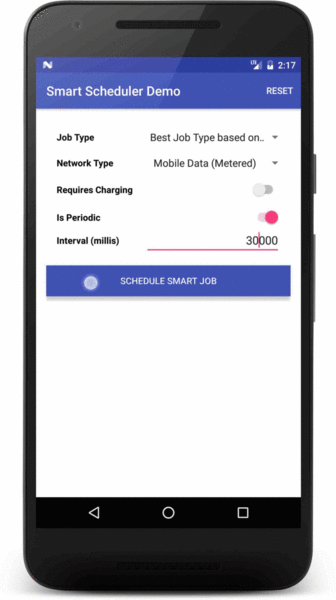A utility library for Android to schedule one-time or periodic jobs while your app is running. Currently, Android OS supports 3 types of scheduling APIs: Handler, AlarmManager and JobScheduler. The choice of one suitable API, the inflexibility of switching between them and the amount of boilerplate code required for setting up makes it difficult to use these APIs.
Want to know more on this and wondering why you should prefer using this library over doing it yourself. Check out the blog post.
android-job is a similar scheduling library, which unifies AlarmManager, GcmNetworkManager & JobScheduler APIs. But when it comes to implementing network dependent jobs for an interval less than 30sec or implementing jobs while the device is in PowerSaver Mode, it fails.
Download the latest version or grab via Gradle:
The library is available on mavenCentral() and jcenter(). In your module's build.gradle, add the following code snippet and run the gradle-sync.
dependencies {
...
compile 'io.hypertrack:smart-scheduler:0.0.2'
...
}
If you didn't turn off the manifest merger from the Gradle build tools, then no further step is required to setup the library. Otherwise you manually need to add the permissions and services like in this AndroidManifest.
-
The class
SmartSchedulerserves as the entry point. You need to create aJobobject with the corresponding job parameters using theJob.Builderclass. -
The
Job.Builderclass has many extra options, e.g. you can specify a required network connection, required charging state, make the job periodic or run the job at an exact time.
SmartScheduler.JobScheduledCallback callback = new SmartScheduler.JobScheduledCallback() {
@Override
public void onJobScheduled(Context context, Job job) {
// Handle onJobScheduled here
}
};
Job.Builder builder = new Job.Builder(JOB_ID, callback, jobType, JOB_PERIODIC_TASK_TAG)
.setRequiredNetworkType(networkType)
.setRequiresCharging(requiresCharging)
.setIntervalMillis(intervalInMillis);
if (isPeriodic) {
builder.setPeriodic(intervalInMillis);
}
Job job = builder.build();
-
Each job has a unique ID. This ID helps to identify the job later to update requirements or to cancel the job. In case this unique ID is not specified in the
Jobobject, one will be auto-generated usingJob.generateJobID()method. -
Once a
Jobobject has been created with the relevant parameters, you can add this job usingSmartSchedulerclass.
SmartScheduler jobScheduler = SmartScheduler.getInstance(getApplicationContext());
boolean result = jobScheduler.addJob(job);
if (result) {
// Job successfully added here
}
- A
Non-PeriodicJob will be removed automatically once it has been scheduled successfully. ForPeriodicJobs, callSmartScheduler.removeJob(jobID)method to remove the job.
SmartScheduler jobScheduler = SmartScheduler.getInstance(getApplicationContext());
boolean result = jobScheduler.removeJob(JOB_ID);
if (result) {
// Job successfully removed here
}
Please use the issues tracker to raise bug reports and feature requests. We'd love to see your pull requests, so send them in!
Developers use HyperTrack to build location features, not infrastructure. We reduce the complexity of building and operating location features to a few APIs that just work. Check it out. Sign up and start building! Join our Slack community for instant responses. You can also email us at help@hypertrack.io


